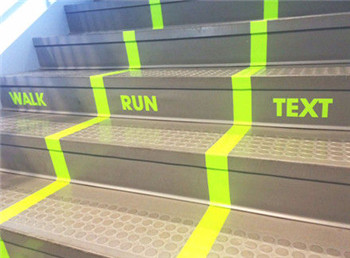(单词翻译:单击)

There’s a “culture of walking and texting” on the Utah Valley University campus, according to conversations with students, but that’s not the main reason Matt Bambrough, the creative director at UVU, came up with an idea to paint a “texting lane” on a staircase leading up to the brand-new Student and Wellness Center. According to Bambrough, it’s first and foremost a design project—the texting lane was a tongue-in-cheek reference to the college-wide epidemic of kids walking around with their faces buried in their iPhones。
美国犹他谷大学的学生们说,这个校园里存在着一种“且行且短你(一边走一边短信)”的特殊校园文化。该校的创意总监马特·班布拉甚至还在通往新学生健康中心的楼梯上画上了一条“发短信专用行人区”。不过据他说,他之所以这样做,可不是为了鼓励这种校园文化。班布拉先生说,这个行人区的设置首先是一种艺术设计作品,其用意是以戏谑的风格表现弥漫整个校园的特殊现象,即——所有的学生都是边走边盯着自己的苹果手机。
“You have 18-24 year olds walking down the hall with smartphones, you’re almost bound to run into someone somewhere; it’s something we’re dealing with in this day and age,” Bambrough said. “But (preventing collisions) isn’t the reason we did it—we did it to engage the students. It’s meant to be there for people to look at and enjoy。”
“那些18岁至24岁之间的孩子们都拿着智能手机在大厅里走来走去,肯定免不了谁撞到谁。在当今时代,我们不得不面对这个问题。”班布拉说到。“不过我们的初衷也不仅仅是避免学生之间的冲突,而是唤起学生们的注意。设置这样一个行人区的目的就是让人们加以注意,会心一笑。”
Still, when talking to a few Utah Valley students, it sounds like texting and walking can be quite the annoyance。
其实,据犹他谷大学的学生们自己反映,他们自己对边走边发短信的现象也感到颇为不满。
Robbie Poffenberger, an assistant news editor at the UVU Review, said that most collisions he witnesses aren’t human-on-human; rather, it’s generally human-on-inanimate-object。
罗比·波分博格是学校报刊的一名编辑助理。他说,在他所目睹的校园冲突中,大多不是发生在人与人之间的,而是发生在人与无生命的电子设备之间的。
“They walk into barriers—chairs on the side of the hallway, or railings,” Poffenberger said. “I’m sure they’re fairly embarrassed。”
“他们会撞到围墙,大厅一侧的长椅,或者栏杆。”波分博格说,“我想他们当时一定很尴尬。”
Poffenberger admits he’s not innocent—”I’m not perfect,” he says。
波分博格自己也承认他也是这种现象的感染者之一,“我并不能置身事外”他说。


